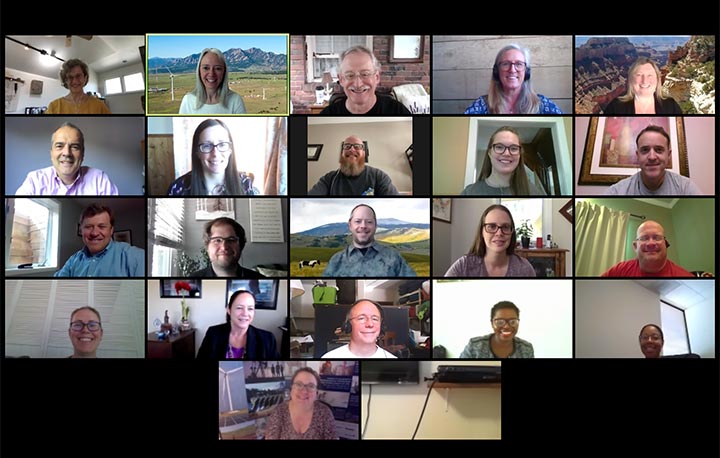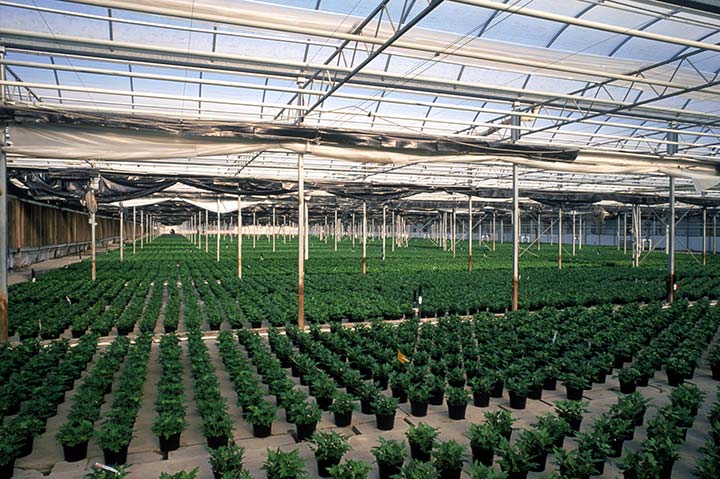Hungry for Analysis: JISEA Workshop Considers Sustainability in Food Systems
July 1, 2020—In partnership with the National Renewable Energy Laboratory and Colorado State University, JISEA hosted a three-day virtual workshop to explore sustainable energy opportunities in food systems.
The workshop convened industry, academia, researchers, and other experts to discuss knowledge gaps and priorities within sustainability in food systems. The three days included technical sessions, facilitated breakout discussions, and productive and lively group dialogue. Access the full presentation.
True to the collaborative JISEA research model, insights gained from the workshop will guide an ongoing research project designed to identify high-impact solutions to reduce the cost of energy in food systems, reduce emissions, increase food production in areas with little or no access to grid electricity, and increase food resilience and security.

Workshop participants pause for a selfie during a breakout session.
Three Days, Three Hundred Questions
While there is significant research on improving the sustainability of farming and land use, very little research exists on energy demands in farming or improving sustainability in other parts of the food system, like buildings used for food production.
The workshop focused on three energy-intensive areas of food systems: buildings for food production (including agriculture and animal), food processing, and food and beverage packaging. The group of participants expressed the need for increased knowledge within the agriculture community around energy solutions and the trade-offs of integrating clean energy into operations. They urged that JISEA should host future conversations to bring together food and energy experts.
"There are major trade-offs between efficiency and resilience in food systems. Plus, every food product has a different system, cost, and price to the consumer so there are many nuances," Becca Jablonski said during a presentation. She is an assistant professor and food system extension economist at Colorado State University, one of JISEA’s five partner institutions.
Many industry partners want to decarbonize their operations or are already working to sustainability, like implementing energy efficiency measures and eco-friendly packaging. Business models for food systems brought up many questions as well. Several participants wondered how clean energy will fit into the contracts that are designed for manufacturing variability.

Indoor food production is an energy-intensive process of food systems that could offer opportunities for improved sustainability and energy efficiency. Photo by Robb Williamson, NREL.
The Importance of a Systems Approach
How far upstream or downstream should the project study? This question inspired a lot of discussion due to the complexities of food systems, as well as its interconnections with other systems like policy, economy, and health.
Taking a systems approach was a recurring theme. Participants encouraged that forthcoming research examine the entire supply chain from farms to transport to retail. Interdisciplinary stakeholders, as well as surrounding communities, should be engaged throughout.
Potential health and equity outcomes of improved technology should also be considered.
"In theory, improved energy efficiency should improve the cost of food production," said Darlene Steward, senior chemical engineer at the National Renewable Energy Laboratory. "Often those costs are passed along to consumers, so they enjoy lower prices and respond by buying more of that food item. It's important to be cognizant of this, knowing that not all food items are nutritionally equivalent, and some foods play more of a role in low-income household budgets."
Join the Consortium
If you are interested in joining the JISEA Sustainability in Food Systems Consortium or want to learn more, please contact Gail Mosey.
Back to JISEA News >
